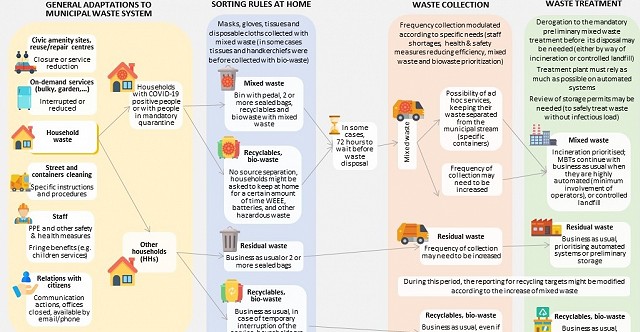By Sarah Massey and Tim Byrne
The current pandemic has brought about significant challenges to the waste industry, on a global scale. Priorities have shifted as the waste sector looks to find solutions and adapted approaches to waste collection, treatment and processing during a time where almost every country is applying some level of ‘lockdown’. Such solutions include prioritising ‘key’ waste streams, increased cleansing of vehicles and modifying street cleansing services. Amongst everything however, it has undoubtedly highlighted the essential work undertaken by our sector.
Action taken to date within the industry on an international scale is showing that there are some clear synergies, largely relating to: management practices; operational procedures to adhere to health & safety guidelines, and; Government advice on social distancing. The subtleties however lie within service provision and how different authorities are modifying these to adapt to localised challenges, be that determined by climate, geography, or socio-demographics. The situation within the UK is rapidly evolving and an area Frith Resource Management is following closely through our weekly updates which are available here.
Across Spain for example, disinfection has formed a large part of the mitigation methods taken. Government led protocols are driving health and safety procedures, which remains a priority. Within cities, there has been a concerted sanitisation effort; many waste management companies have stepped up their sanitisation procedures to disinfect bins, hard surfaces and clean streets either to a higher level, or more frequently. Many municipalities have modified collection systems, i.e. pausing bulky waste or low priority materials (such as textiles) collections. In Palma, street cleansing of usually bustling tourist areas has been simplified and collection routes have been adjusted whilst businesses remain closed. At the kerbside, packaging is reported to be up around 15%.
The situation across the Atlantic is broadly similar. At both the Federal and State level, health and safety is prioritised and PPE is encouraged to prevent workers from exposure to the virus and protect personal safety. Domestic kerbside collection services remain largely unaffected, albeit New York (an extreme area in terms of Covid-19) has stopped food waste collections. However, it is estimated that domestic volumes of waste are up 30%, and this is applying pressure on service delivery and state budgets. ‘Drop Off Centres’ (the equivalent of our HWRCs) remain open, which has reported an increase in 70% of users. At least 8 of the ‘bottle bill’ states (those operating a Deposit Return System) have temporarily suspended enforcements but as they feed a significant proportion of the recycled materials market, pressure is being applied to have these reinstated.
At an operational level, collection companies are trying to reduce contact between staff e.g. on collection rounds. Some drivers-mates are driving independently to the beginning of routes to minimise contact with driver, and at MRFs operators must adhere to social distancing guidelines along picking lines. The industry is used to volatility, but this pandemic is unique in hitting supply and demand at the same time, as the public is radically changing the way we consume products. In the US, a $2bn dollar loss to the waste and resource industry is expected. The US economy is heavily reliant on materials processing within the manufacturing sector, with 40% of recycled materials entering the manufacturing sector each year. Therefore, getting the waste industry classified as ‘essential’ and ensuring recycling continues is critical to ensuring material flows and to keep the industry in motion where safe to do so.
A summary of observed trends in municipal waste management across Europe has been developed by the Association of Cities and Regions for sustainable Resource management (ACR) and is presented in the schematic below.

The International Solid Waste Association (ISWA) has also issued a position statement on waste management during Covid-19 and advises 3 overall priorities:
- “Authorities should ensure that waste management, recycling services treatment and disposal facilities will not be disrupted and no extra risks for public health will be created by improper waste management.”
- “recycling activities should be re-adjusted to avoid cross-contamination and infections” and
- “increased quantities of healthcare and medical waste be safely treated and disposed”.
Responses from individual countries can be found here.
What is clear, is that there are synergies between the approaches adopted across the globe. First and foremost, the priority has been focused on rapidly updating and implementing health and safety procedures to ensure the safety of both the public and workers within the industry. Secondly, it has involved modifying frontline services to maintain key service delivery and ensure our local environments remain safe and clean to support the wider imperative of reducing disease transmission.
Covid-19 has certainly highlighted the integral role that waste collection and street cleansing operators play within society. During any pandemic, public health is the number one priority, but sanitation is often inextricably linked with this, and the waste industry is amongst the critical team protecting our local environment and the public sphere. Long after the lockdown is over may we appreciate the hard work undertaken by all across the sector, around the world.
Sarah Massey is a Senior Consultant at Frith Resource Management, Tim Byrne is an International Waste Manager and Associate of FRM













